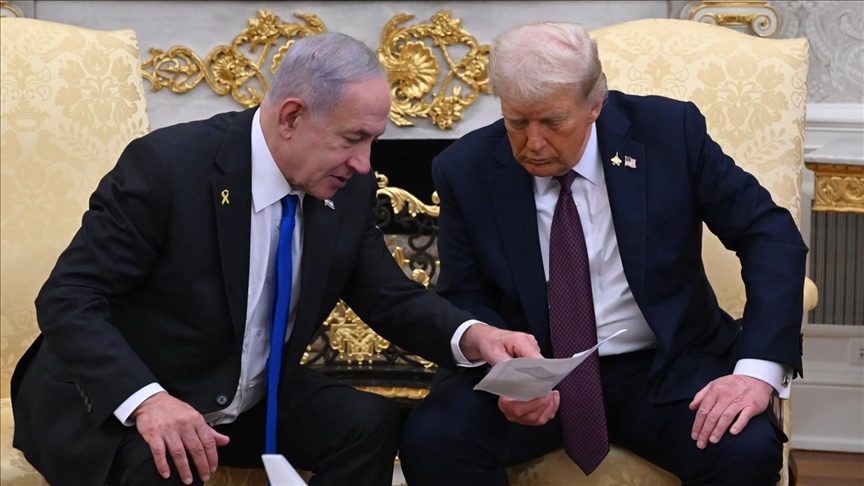Trump Unveils 20-Point Plan to End Gaza War and Secure Hostage Release

President Donald Trump has outlined a 20-point proposal aimed at ending the ongoing war in Gaza and securing the release of remaining hostages. The plan has been endorsed by Israeli Prime Minister Benjamin Netanyahu and is now under review by Hamas representatives, with mediators from Qatar and Egypt playing key roles in conveying the proposal.
The proposal, which comes amid deepening frustration over the prolonged conflict, includes a number of provisions that previous negotiations have struggled to resolve—most notably the requirement for Hamas to disarm. While this condition has been consistently rejected in past talks, current dynamics on the ground appear to have shifted calculations.
Following a meeting at the White House, Netanyahu signalled that Israel views the plan as a final offer. He warned that if Hamas fails to accept the terms, Israel will move forward unilaterally to bring the war to a close.
The Palestinian leadership in the West Bank has expressed support for the proposal and has pledged to implement the governance and institutional reforms it outlines. The plan also received positive reactions from several regional governments, including Egypt, Jordan, Qatar, Saudi Arabia, the United Arab Emirates, and others, who issued a joint statement in support of the initiative.
Despite these developments, several unresolved issues remain. The proposal does not address the establishment of a Palestinian state—a demand that many regional actors and international stakeholders consider essential for long-term peace. Instead, it calls for governance reforms and the formation of a temporary governing body that would include international figures and Palestinian technocrats. The reformed Palestinian Authority would be expected to take over civilian administration at a later stage.
Unlike earlier versions, this plan does not call for population displacement from Gaza. It does, however, demand the release of all remaining hostages by Hamas within 72 hours of the group accepting the agreement. In exchange, Israel would release hundreds of Palestinian prisoners, including many serving life sentences.
President Trump emphasised that progress is being made, stating that the leadership of Hamas has been significantly weakened and that this may create conditions for agreement. He affirmed that if Hamas rejects the plan, Israel would continue its military campaign with the full backing of the U.S. administration.
Under the terms of the proposal, Hamas members who disarm and commit to peaceful political engagement would be granted amnesty, and those who choose to leave Gaza would be allowed safe passage to third countries.
As diplomatic efforts continue, a recent Israeli military strike targeting Hamas officials in Qatar has added a layer of tension. The incident, which reportedly resulted in the death of a Qatari serviceman, drew strong criticism from the region. During his White House visit, Netanyahu called Qatar’s prime minister to express regret for the strike, which was described as a violation of Qatari sovereignty. The Israeli government committed to preventing similar incidents in the future.
Despite these assurances, some members of Israel’s governing coalition publicly supported the strike, creating internal political friction. Netanyahu now faces the challenge of balancing international pressure with the demands of his domestic political allies, many of whom oppose any concessions to Hamas or the idea of halting the military campaign before the group is fully dismantled.
In a related development, Trump reaffirmed that the U.S. will not support Israeli annexation of the West Bank, a position at odds with certain elements of Netanyahu’s coalition. He has also pledged continued U.S. involvement in regional diplomacy and humanitarian efforts.
According to estimates, Hamas is currently holding 48 hostages, with around 20 believed to be alive. The group has previously conditioned their release on a complete Israeli withdrawal from Gaza and a permanent ceasefire—conditions not met in the new plan.
During recent meetings with Arab and Islamic leaders on the sidelines of the U.N. General Assembly, Trump presented the plan as an opportunity for a new beginning. He called on Palestinian leaders to take charge of their own political future and pledged support for building institutions that promote democracy and nonviolence.
The war, now nearing its third year, began with a large-scale attack in 2023 that left over 1,200 people in Israel dead and more than 250 taken hostage. Since then, the conflict has caused widespread devastation across Gaza. According to figures from the Gaza Health Ministry, over 66,000 Palestinians have been killed, and about 90 percent of the population has been displaced. Famine and limited access to humanitarian aid continue to worsen conditions.
International calls for a ceasefire have intensified. In recent weeks, several countries, including traditional allies of Israel, have formally recognised Palestinian statehood and criticised Israel’s conduct in the war. Some Arab nations have gone further, accusing Israel of committing war crimes or even genocide—a charge Israel denies and is currently contesting at the International Court of Justice.
Whether this latest proposal will mark a turning point remains unclear. While some parties view it as a step toward peace, others remain skeptical, pointing to unresolved core issues such as sovereignty, statehood, and mutual recognition.

tayabet https://www.yetayabet.net